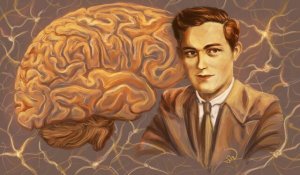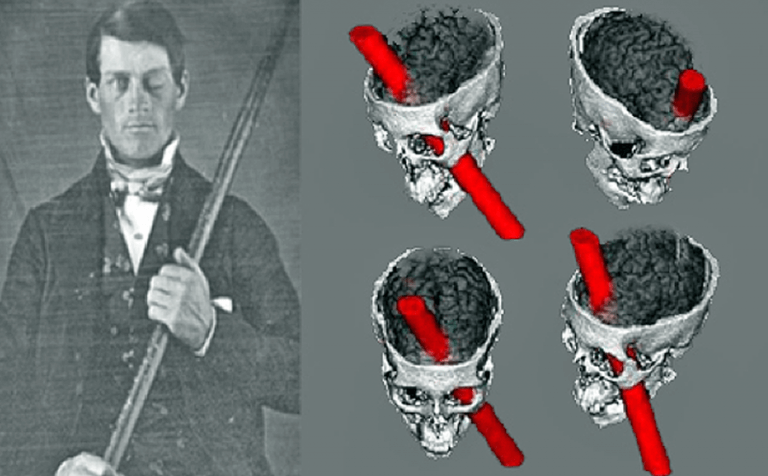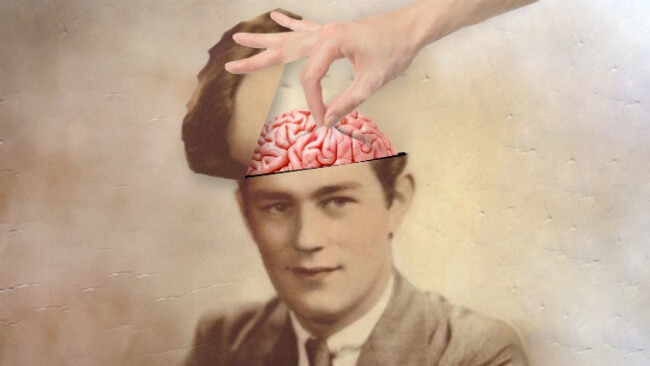Three Clinical Cases that Changed How We View the Brain

Neuroscience has made huge strides thanks to research into both ordinary and sometimes quite extraordinary clinical cases. Some of these cases are famous mainly because they significantly improved our understanding of how the brain works.
Many people are hesitant to admit that what they call the “soul” or the “heart” really has to do with processes that take place in the brain. One valuable thing about the clinical cases below, which have turned into classic case studies, is that some way or another, they gave evidence of the brain’s involvement in our psychic world.
“Any man can be the sculptor of his own brain if he chooses.”
-Santiago Ramón y Cajal-
We’re still very far from completely understanding the brain. However, we’ve been slowly advancing step by step, unraveling some mysteries, then finding new ones. The three clinical cases described below deserve to be remembered for how much they’ve contributed to our knowledge about the brain.
Phineas Gage
Phineas Gage was an American railroad worker who had a strange accident. In September 1848, the young worker was in the process of blasting rock when he made a mistake and the explosion went off earlier than expected.
As a result of his miscalculation, Phineas was thrown about 20 meters away and impaled by an iron rod. It entered his face through his cheek and came out through the top of his head.

Dr. Harlow was Phineas’s doctor and left a record of what happened, seeming to be quite impressed that Phineas remained conscious after the accident and showed no signs of having lost contact with reality. The recovery period took only 10 weeks, and he never seemed to lose his cognitive capabilities.
Following recovery, Gage returned to work as usual, but he started showing personality changes. Before, he was even-tempered, but now he was extremely irritable, among other changes. This is one of those clinical cases that is now a classic example of how behavioral patterns and even personality are related to the physical brain.
However, some studies suggest that the effects of his brain trauma and facial disfiguration weren’t studied in enough detail. Some believe those factors could have also greatly influenced his change in personality.
Patient H.M.
Here is another of history’s remarkable clinical cases that had a huge impact in psychology. The initials stand for Henry Molaison, known to many as Patient H.M. When he was 27, he underwent surgery to remove parts of his brain. His hippocampus and part of his amygdala were removed to cure his epilepsy.

The results of the surgery were surprising. Patient H.M. was unable to store new memories. He could remember everything that happened before the surgery, but nothing after.
He was living perpetually in the present, forgetting everything right after it happened. For example, if someone entered the room, he would greet them. But if they left and came back soon after, he wouldn’t recognize them.
Throughout his life, doctors were always around H.M., but he never regained the ability to form new memories. He died in 2008, and because his ranks among the most famous clinical cases, the world could view the autopsy of his brain streaming on the internet.
During the procedure, they discovered that the most damaged part of his brain was the entorhinal cortex, the same area that deteriorates in the initial stages of Alzheimer’s disease.
Remarkable clinical cases in psychology: Donald
Donald murdered his girlfriend under the influence of phencyclidine (PCP) but had no memory of it. He was then diagnosed with organic amnesia. Years later he was riding his bicycle on a pass from the hospital. Suddenly, he was hit by a car and left in a coma. When we woke up, something extraordinary happened.

Donald started to remember the murder, having uncontrollable flashbacks over and over again. He constantly replayed it in his mind. He also had seizures.
Donald’s is one of the most mysterious clinical cases we know of. Science still hasn’t been able to explain why his lost memory came back. Even less is known about why the memory manifested in such a tormenting way.
These are just a few of the most significant clinical cases in the history of psychology. Each one has moved us forward, sometimes blindly, in our knowledge of the incredible organ that is the brain.
Unfortunately, the people who made these advancements possible suffered from the effects of having an abnormal brain. But they did leave a great gift to the rest of humanity because of it.
Neuroscience has made huge strides thanks to research into both ordinary and sometimes quite extraordinary clinical cases. Some of these cases are famous mainly because they significantly improved our understanding of how the brain works.
Many people are hesitant to admit that what they call the “soul” or the “heart” really has to do with processes that take place in the brain. One valuable thing about the clinical cases below, which have turned into classic case studies, is that some way or another, they gave evidence of the brain’s involvement in our psychic world.
“Any man can be the sculptor of his own brain if he chooses.”
-Santiago Ramón y Cajal-
We’re still very far from completely understanding the brain. However, we’ve been slowly advancing step by step, unraveling some mysteries, then finding new ones. The three clinical cases described below deserve to be remembered for how much they’ve contributed to our knowledge about the brain.
Phineas Gage
Phineas Gage was an American railroad worker who had a strange accident. In September 1848, the young worker was in the process of blasting rock when he made a mistake and the explosion went off earlier than expected.
As a result of his miscalculation, Phineas was thrown about 20 meters away and impaled by an iron rod. It entered his face through his cheek and came out through the top of his head.

Dr. Harlow was Phineas’s doctor and left a record of what happened, seeming to be quite impressed that Phineas remained conscious after the accident and showed no signs of having lost contact with reality. The recovery period took only 10 weeks, and he never seemed to lose his cognitive capabilities.
Following recovery, Gage returned to work as usual, but he started showing personality changes. Before, he was even-tempered, but now he was extremely irritable, among other changes. This is one of those clinical cases that is now a classic example of how behavioral patterns and even personality are related to the physical brain.
However, some studies suggest that the effects of his brain trauma and facial disfiguration weren’t studied in enough detail. Some believe those factors could have also greatly influenced his change in personality.
Patient H.M.
Here is another of history’s remarkable clinical cases that had a huge impact in psychology. The initials stand for Henry Molaison, known to many as Patient H.M. When he was 27, he underwent surgery to remove parts of his brain. His hippocampus and part of his amygdala were removed to cure his epilepsy.

The results of the surgery were surprising. Patient H.M. was unable to store new memories. He could remember everything that happened before the surgery, but nothing after.
He was living perpetually in the present, forgetting everything right after it happened. For example, if someone entered the room, he would greet them. But if they left and came back soon after, he wouldn’t recognize them.
Throughout his life, doctors were always around H.M., but he never regained the ability to form new memories. He died in 2008, and because his ranks among the most famous clinical cases, the world could view the autopsy of his brain streaming on the internet.
During the procedure, they discovered that the most damaged part of his brain was the entorhinal cortex, the same area that deteriorates in the initial stages of Alzheimer’s disease.
Remarkable clinical cases in psychology: Donald
Donald murdered his girlfriend under the influence of phencyclidine (PCP) but had no memory of it. He was then diagnosed with organic amnesia. Years later he was riding his bicycle on a pass from the hospital. Suddenly, he was hit by a car and left in a coma. When we woke up, something extraordinary happened.

Donald started to remember the murder, having uncontrollable flashbacks over and over again. He constantly replayed it in his mind. He also had seizures.
Donald’s is one of the most mysterious clinical cases we know of. Science still hasn’t been able to explain why his lost memory came back. Even less is known about why the memory manifested in such a tormenting way.
These are just a few of the most significant clinical cases in the history of psychology. Each one has moved us forward, sometimes blindly, in our knowledge of the incredible organ that is the brain.
Unfortunately, the people who made these advancements possible suffered from the effects of having an abnormal brain. But they did leave a great gift to the rest of humanity because of it.
This text is provided for informational purposes only and does not replace consultation with a professional. If in doubt, consult your specialist.







